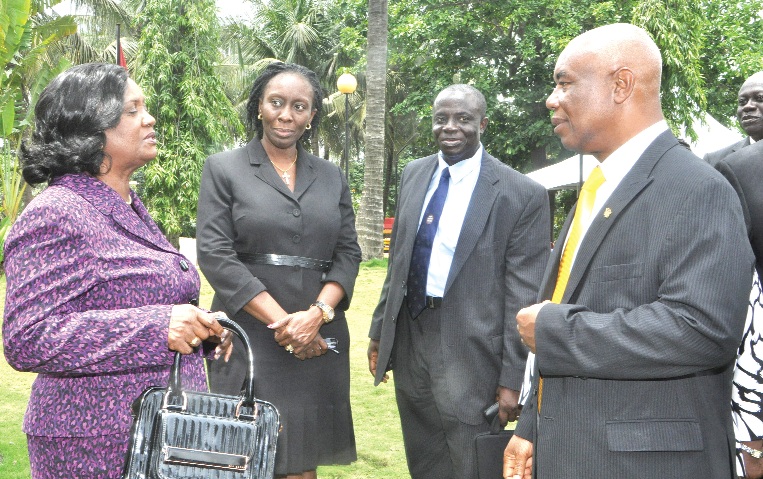 Her
Ladyship Georgina Wood (left), the Chief Justice, interacting with Mrs
Marrietta Brew Appiah-Opong (2nd left), Sir Justice Denis Adjei (2nd
right) and Justice Dotse at the annual general meeting organised by the
AMJG in Accra
Her
Ladyship Georgina Wood (left), the Chief Justice, interacting with Mrs
Marrietta Brew Appiah-Opong (2nd left), Sir Justice Denis Adjei (2nd
right) and Justice Dotse at the annual general meeting organised by the
AMJG in AccraA Supreme Court judge, Mr Justice Jones Victor M. Dotse, has advocated the setting up of small claims courts to cater for the myriad of disputes among litigants.
Those courts, he said, would have to cater for small monetary claims, disputes among landlords and tenants, compensations, minor civil claims, land and boundary disputes, succession disputes, among others.
“This is because there appears to be so much frustration faced by litigants in small claims of whatever nature that if they lose confidence in the administration of justice, chaos and anarchy will be the result”, Mr Justice Dotse stated in a keynote address he delivered at the opening of the Annual General Meeting (AGM) of the Association of Judges and Magistrates, Ghana (AMJG) in Accra yesterday.
The theme for the 34th AGM is, “Thinking Ahead, Advocating a Stable and Effective Justice System Through Increased Efficiency”.
Mr Justice Dotse was delegated by the Chief Justice, Mrs Justice Georgina Theodora Wood, to give the keynote address at the AGM, which will end on Friday, October 4, 2013.
Much as he admitted that the judiciary had performed creditably, he held that, “we can do even much better by having attitudinal changes in the way we handle our work”.
“One sure way of increasing efficiency is to eliminate all delay tactics, avoid acts of favouritism, nepotism, corruption and exhibit a high sense of honesty, competence, hard work and, above all, humility and respect for our fellow human beings,” he said.
He urged the judges and magistrates to be abreast of modern technology but advised them not to abuse the use of technology.
President of AMJG
The President of the AMJG, Sir Justice Dennis Adjei, said the theme for this year’s AGM was “to enable us to do self-introspection and dialogue on how to avoid waste in our adjudicative role”.
He said by the time the AGM ended, judges should be able to find antidotes to problems such as non-proof of service by bailiffs, unnecessary adjournments and rigid and very technical rules which ended up promoting multiplicity of suits and applications.
He said there was the need for the laws governing the jurisdiction of the lower courts to be reviewed, since most of those laws were obsolete and did not meet modern trends.
Message from Chief Justice
In a brief remark, Mrs Justice Wood congratulated hardworking judges and magistrates on meeting deadlines by submitting their judgements for analysis.
She reminded them that it was a “must” for them to send copies of judgements they had delivered at the end of each term for assessment and evaluation.
The Chief Justice said the Judicial Service was poised to improve the conditions of service of its employees and, accordingly, urged all to put in their best to further improve the administration of justice in the country.
Attorney-General’s message
In a fraternal message to the judges and magistrates, the Attorney-General and Minister of Justice, Mrs Marrietta Brew-Oppong Appiah, underscored the need for a speedy, efficient and effective adjudication of cases before the courts.
She advocated the application of parameters to ensure an efficient justice delivery system.
Notable among them are timely decisions on cases, effective monitoring and evaluation of the courts, adoption of information and communications technology (ICT), the promotion of alternative dispute resolution (ADR) mechanisms, as well as the continuous training of judges.
“Let me conclude by saying that stable and effective justice through increased efficiency and waste elimination is not the exclusive responsibility of the judiciary but involves the co-operation of members of the bar, litigants and court staff, even though a judge is always in control of proceedings in court,” Mrs Appiah added.
GBA
The President of the Ghana Bar Association (GBA), Nene Amegatcher, expressed regret at the attack on some justices of the Supreme Court who presided over the 2012 presidential election petition and promised that the GBA would go all out to protect the interest and sanctity of the judiciary.
He said it was unfortunate that the critics were not making use of the appropriate forums as stated under the law and that the GBA would “continue to fight for the rule of law and an independent Judiciary”.
Delivering the fraternity message on behalf of the Students Representative Council of the Ghana School of Law, Mr Kwasi T. Oppong-Kyekyeku thanked the AMJG for the invitation and reiterated his wish for further enhanced relationship with the association.
No comments:
Post a Comment